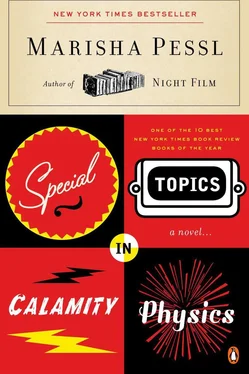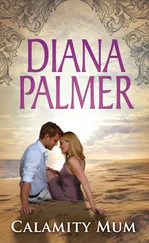“To get on the highway,” he said. “It might remind us that no matter the tragedy, there’s always a world beyond it. ‘Whither goest thou, America, in thy shiny car in the night?’”
I continued to stare at the TV, my eyes sore, my thin bathrobe, the color of tongues, limp around my legs.
“Did you have an affair with Hannah Schneider?” I asked.
Dad was so shocked he didn’t immediately speak. “I— what? ”
I repeated the question.
“How can you ask such a thing?”
“You had an affair with Eva Brewster, so maybe you also had an affair with Hannah Schneider. Maybe you had an affair with the entire school and kept me in the dark—”
“Of course not,” Dad said irritably, then he took a deep breath and added very quietly, “I did not have an affair with Hannah Schneider. Sweet, you should stop this… brooding —it isn’t good. What can I do? Tell me. We can move somewhere. California. You always wanted to go to California, didn’t you? Any state you like…”
Dad was grabbing at words the way drowning people grab at floating bits of plywood. I didn’t say anything.
“Well,” he said, after a minute. “You have my office number. I’ll be home around two to check on you.”
“ Don’t check on me.”
“Sweet.”
“What?”
“There’s that macaroni—”
“In the fridge, which I can reheat for lunch — yes, I know. ”
He sighed and covertly I glanced over at him. He looked as if I’d punched him in the face, as if I’d spray-painted PIG on his forehead, as if I’d told him I wished he was dead.
“You’ll call if you need anything?” he asked.
I nodded.
“If you’d like, on my way home I can pick up a few videos from — what is that—?”
“Videomecca.”
“Right. Any requests?”
“Gone with the Fucking Wind,” I said.
Dad kissed me on the cheek and walked through the hall to the front door. It was one of those instances one feels as if one’s skin has abruptly become thin as one layer of phyllo dough on a triangle of baklava, when one desperately doesn’t want the other person to go, but one doesn’t say anything in order to feel isolation in its purest form, as a periodic table element, one of the noble gases, Iso 1.
The front door closed, locked. To the far-off tune of the blue Volvo driving away, it slipped over me, sadness, deadness, like a sheet over summer furniture.
I guess it was shock, the body’s spin on distress, what Jemma Sloane drearily refers to on p. 95 of her book on “confrontational children,” Raising Goliath (1999): “child coping mechanisms.” Whatever the psychological grounds, for the next four days following their rescue (as my beloved Chernobyl reported during First News at Five , returned to their homes like damaged parcels) I adopted the character and deportment of a nasty ninety-year-old widow.
Dad had to work, so I spent the rest of Spring Break alone. I said little. What I did say tended to be to myself or to my colored companion, the TV (Chernobyl proved more enjoyable than any show-offy grandchild). Dad was the grossly underpaid yet loyal caretaker who showed up at regular intervals to make sure I hadn’t burned down the house, that I ate my prepared meals and didn’t fall asleep in strange positions that could lead to injury or death. He was the nurse who held his tongue when I was irritable, in the off chance I might keel over.
When I felt up to it, I ventured outside. The rueful weekend of rain had given way to conceited sunshine. It was too much — the glare, the grass like straw. The sun harassed the yard with a shamelessness I’d never noticed before, inundating the leaves, scalding the pavement. Also offensive were the earthworms, those vagrants, visibly hungover from the downpour, so wasted they were unable to mobilize and fried themselves into orange french fries all over the driveway.
I scowled, kept my bedroom shades pulled, hated everyone, felt grouchy. As soon as Dad drove away in the morning, I rummaged through the kitchen trash to retrieve the latest Stockton Observer , which he’d thrown out early in the morning, so I wouldn’t see the headlines and fester over what had happened. (He didn’t know my well-being was a lost cause; I had little appetite and sleep remained likely as phoenix eggs.)
Around five o’clock, before he came home, I returned the newspaper to the trash can, carefully repositioning it below last night’s rigatoni with tomato sauce (the UNCS Political Science Department assistant, Barbara, had given Dad a few “comfort food” recipes; supposedly they’d been the rock that helped some wayward stepson, Mitch, through rehab). It was a stealthy exercise, much like hiding one’s medication in the elastic of a fitted sheet, crushing it up with a soupspoon, using it to fertilize geraniums.
“Teacher Death Shocks School,” “Dead Woman Beloved Teacher, Community Activist,” “Investigators Hold Details of Local Death”—these were the keyed-up articles about it, us, her. They rehashed the specifics of the rescue, the Stockton community’s “shock,” “disbelief” and “sense of loss.” Jade, Charles, Milton, Nigel and Lu all got their names and grinning yearbook pictures in the paper. (I did not — another blow for being the first found.) They quoted Eva Brewster: “We can’t believe it.” They also quoted Alice Kline, who’d worked with Hannah at the Burns County Animal Shelter: “It’s so sad. She was the happiest, kindest person in the world. All the dogs and cats are waiting for her to come back.” (When someone died prematurely they routinely become the Happiest, Kindest Person.)
Apart from “Investigation Continues into Park Death,” which explained that her body had been discovered two miles from Sugartop Summit, that she had been hanging by an electrical cord, none of the other articles said anything new. After a while, I found it all stomach-turning, especially the editorial, “WNC Murder, Evidence of Voodoo,” by R. Levenstein, some “local critic, conservationist and Web blogger” speculating that her death was occult related. “The police’s continuing reluctance to disclose the details of Hannah Schneider’s death steers the astute observer to a conclusion local authorities have been trying to cover up for years: there is a growing populace of witches in Sluder and Burns Counties. ”
No, it wasn’t like it was in the Olden Days.
Due to my new fondness for trawling through the trash, I was able to locate something else of note Dad had discarded for the sake of my mental health, The St. Gallway Bereavement Pack. Judging from the date on the large manila envelope in which it’d come, apparently The Pack had been launched with the velocity of a Tomahawk cruise missile as soon as news of the catastrophic event hit school radars.
The Pack included a letter from Headmaster Havermeyer (“Dear Parents: We are saddened this week by the death of one of our dearest teachers, Hannah Schneider…”), an overexcited article from a 1991 issue of Parenting magazine, “How Children Grieve,” a schedule of counseling times and room numbers, Crisis Team constituents, a pair of 24-hour 800-numbers to call for psychological assistance (1-800-FEEL-SAD, and another I find difficult to remember, 1-800-U-BEWAIL, I believe) and a tepid postscript about a funeral (“A date for Ms. Schneider’s memorial service has yet to be arranged.”).
One can imagine how strange it was for me to read these carefully prepared materials, to realize they were talking about Hannah, our Hannah, the Ava Gardnered person across from whom I’d once eaten pork chops — how scary and sudden the shift from Living to Dead. Chiefly unsettling was the fact that The Pack mentioned nothing of how she’d died. True, The Pack had been prepared and mailed well before the Sluder County Coroner’s Office would release its autopsy report. Yet the omission was bizarre, as if she hadn’t been murdered (a sensational word; if I had my way there’d be something a little more serious at the intersection of Death, Murder and Slaughter — Mauleth, perhaps). Instead, according to The Pack, Hannah had simply “passed” she’d been playing poker and decided not to take another card. Or, reading Havermeyer’s spongy wording, one had the sense she’d been seized (“taken from us”), King-Kong-style (“without warning”), by the gigantic, smooth hand of God (“she’s in good hands”), and though such an event was gruesome (“one of life’s toughest lessons”) everyone should nail a grin to their face and continue robotically with daily life (“we must continue on, loving each day, as Hannah would’ve wanted”).
Читать дальше












